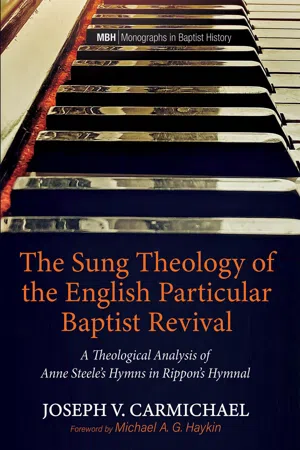
The Sung Theology of the English Particular Baptist Revival
A Theological Analysis of Anne Steele's Hymns in Rippon's Hymnal
- 270 pages
- English
- ePUB (mobile friendly)
- Available on iOS & Android
The Sung Theology of the English Particular Baptist Revival
A Theological Analysis of Anne Steele's Hymns in Rippon's Hymnal
About this book
Anne Steele (1717-1778) originally wrote her hymns to be sung in the Baptist congregation pastored by her father. The foremost female contemporary of hymn-writing giants Charles Wesley, John Newton, and William Cowper, her hymns are infused with spiritual sensitivity,theological depth, and rawemotion. She eventually published her hymns under the pseudonym, Theodosia, which means "God's Gift." She believed God had given her a gift to share. Steele's work was warmly received in her own day. Pastor and publishing pioneer of the modern English hymnal, John Rippon, included more than fifty of her hymns in the various topical sections of his wildly successful Selection of Hymns. Rippon's hymnal was popular on both sides of the Atlantic, but was especially influential during the nineteenth-century revival and renewal of English Particular Baptists. This book introduces Steele's hymns in the context of her life and times and of Rippon's hymnal. It illustrates that Steele's approach to hymn-writing is a model of biblical spirituality. Each hymn as printed in Rippon's hymnal, and thus sung by congregations and used as devotional literature, is considered. The sung theology of these congregations is a gift to the church universaland worth rediscovering in the twenty-first century.
Frequently asked questions
- Essential is ideal for learners and professionals who enjoy exploring a wide range of subjects. Access the Essential Library with 800,000+ trusted titles and best-sellers across business, personal growth, and the humanities. Includes unlimited reading time and Standard Read Aloud voice.
- Complete: Perfect for advanced learners and researchers needing full, unrestricted access. Unlock 1.4M+ books across hundreds of subjects, including academic and specialized titles. The Complete Plan also includes advanced features like Premium Read Aloud and Research Assistant.
Please note we cannot support devices running on iOS 13 and Android 7 or earlier. Learn more about using the app.
Information
Introduction
Table of contents
- Title Page
- Foreword
- Preface
- Acknowledgments
- Chapter 1: Introduction
- Chapter 2: A Biography of Anne Steele
- Chapter 3: The Setting of Anne Steele’s Hymns and John Rippon’s Selection of Hymns
- Chapter 4: Anne Steele as a Hymn-writer
- Chapter 5: Anne Steele’s Hymns and Psalms in John Rippon’s Selection of Hymns
- Chapter 6: Conclusion
- Bibliography